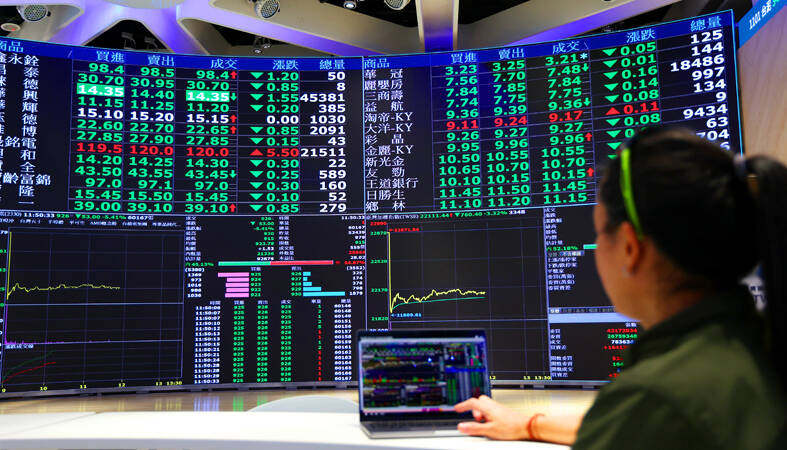Taiwan Semiconductor Manufacturing Co (TSMC, 台積電) shares fell the most in three months yesterday upon trading resumption, joining a global technology rout as investors dramatically soured on the promises of artificial intelligence (AI).
The shares declined 5.62 percent to close at NT$924 in Taipei, dragging down the benchmark TAIEX, which fell 3.29 percent to 22,119.21 points amid a technical correction, Taiwan Stock Exchange data showed.
Other chip stocks also fell, with ASE Technology Holding Co (日月光投控) plunging 9.86 percent, MediaTek Inc (聯發科) dropping 2.35 percent, Realtek Semiconductor Corp (瑞昱) falling 1.33 percent and United Microelectronics Corp (聯電) retreating 1.17 percent, while Apple Inc manufacturing partner Hon Hai Precision Industry Co (鴻海精密) slumped 4.71 percent.

Photo: CNA
Local markets reopened after a two-day closure due to Typhoon Gaemi.
Lackluster earnings from US technology firms have set off a reckoning on the AI hype.
The latest technology rout adds further pressure on TSMC, whose record-breaking rally has been faltering since the middle of this month. A favored AI play due to its cutting-edge chips and stellar earnings, concern over a pricey valuation and the risk of tighter US curbs on chip sales to China have poured cold water on the bullish momentum.
The rotation out of valuation-stretched technology names has been “exacerbated by weak results from ‘Magnificent Seven’ titans Alphabet Inc and Tesla Inc, and some negative news flow on China tariffs,” Union Bancaire Privee SA managing director Ling Vey-sern (凌煒森) said. “Whether the tech sell-off will continue will depend on key results next week which will see four of the Magnificent Seven stocks report,” such as Apple and Amazon.com Inc.
TSMC shares have now fallen more than 14 percent from their peak. The decline spells trouble for the local financial market given the stock accounts for more than one-third of TAIEX’s weighting.
The change of fortunes for Taiwan’s shares has been swift. Earlier this year, surging interest in AI shares had triggered an unprecedented investment boom. The rally led to retail investors piling into exchange-traded funds, and prompted local regulators to warn over herding behavior.
TSMC’s drop could be due to profit-taking, while “whispers of a potential slowdown in the AI investment boom might also be at play,” Straits Investment Management Pte Ltd chief executive officer Manish Bhargava said. “The wider context of AI momentum can’t be dismissed. The burning question is — is the AI rally running out of steam?”
A TSMC spokesperson said there had been no impact from the typhoon as of Thursday.
Taiwan’s US$2.5 trillion stock market was shut on Wednesday and Thursday as Typhoon Gaemi approached after inundating the Philippines. The last time that Taipei was shut for two days in a row for a typhoon was in 2016.
The New Taiwan dollar gained as much as 0.2 percent against the greenback yesterday, before trading little changed and closing at NT$32.831 per US dollar. Earlier this month, the Taiwanese currency fell to its weakest level since 2016 amid intensified outflows from local equities.
Additional reporting by staff writer

Taiwan’s foreign exchange reserves hit a record high at the end of last month, surpassing the US$600 billion mark for the first time, the central bank said yesterday. Last month, the country’s foreign exchange reserves rose US$5.51 billion from a month earlier to reach US$602.94 billion due to an increase in returns from the central bank’s portfolio management, the movement of other foreign currencies in the portfolio against the US dollar and the bank’s efforts to smooth the volatility of the New Taiwan dollar. Department of Foreign Exchange Director-General Eugene Tsai (蔡炯民)said a rate cut cycle launched by the US Federal Reserve

The US government on Wednesday sanctioned more than two dozen companies in China, Turkey and the United Arab Emirates, including offshoots of a US chip firm, accusing the businesses of providing illicit support to Iran’s military or proxies. The US Department of Commerce included two subsidiaries of US-based chip distributor Arrow Electronics Inc (艾睿電子) on its so-called entity list published on the federal register for facilitating purchases by Iran’s proxies of US tech. Arrow spokesman John Hourigan said that the subsidiaries have been operating in full compliance with US export control regulations and his company is discussing with the US Bureau of

Businesses across the global semiconductor supply chain are bracing themselves for disruptions from an escalating trade war, after China imposed curbs on rare earth mineral exports and the US responded with additional tariffs and restrictions on software sales to the Asian nation. China’s restrictions, the most targeted move yet to limit supplies of rare earth materials, represent the first major attempt by Beijing to exercise long-arm jurisdiction over foreign companies to target the semiconductor industry, threatening to stall the chips powering the artificial intelligence (AI) boom. They prompted US President Donald Trump on Friday to announce that he would impose an additional

Pegatron Corp (和碩), a key assembler of Apple Inc’s iPhones, on Thursday reported a 12.3 percent year-on-year decline in revenue for last quarter to NT$257.86 billion (US$8.44 billion), but it expects revenue to improve in the second half on traditional holiday demand. The fourth quarter is usually the peak season for its communications products, a company official said on condition of anonymity. As Apple released its new iPhone 17 series early last month, sales in the communications segment rose sequentially last month, the official said. Shipments to Apple have been stable and in line with earlier expectations, they said. Pegatron shipped 2.4 million notebook